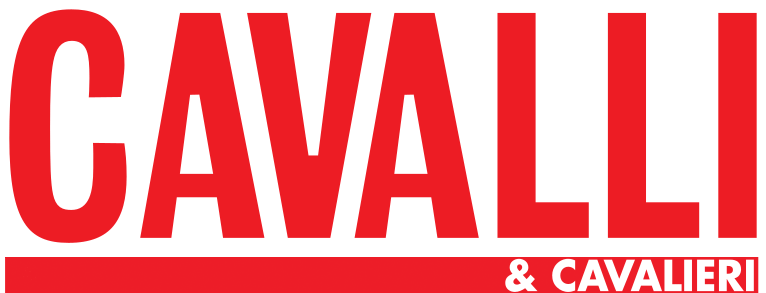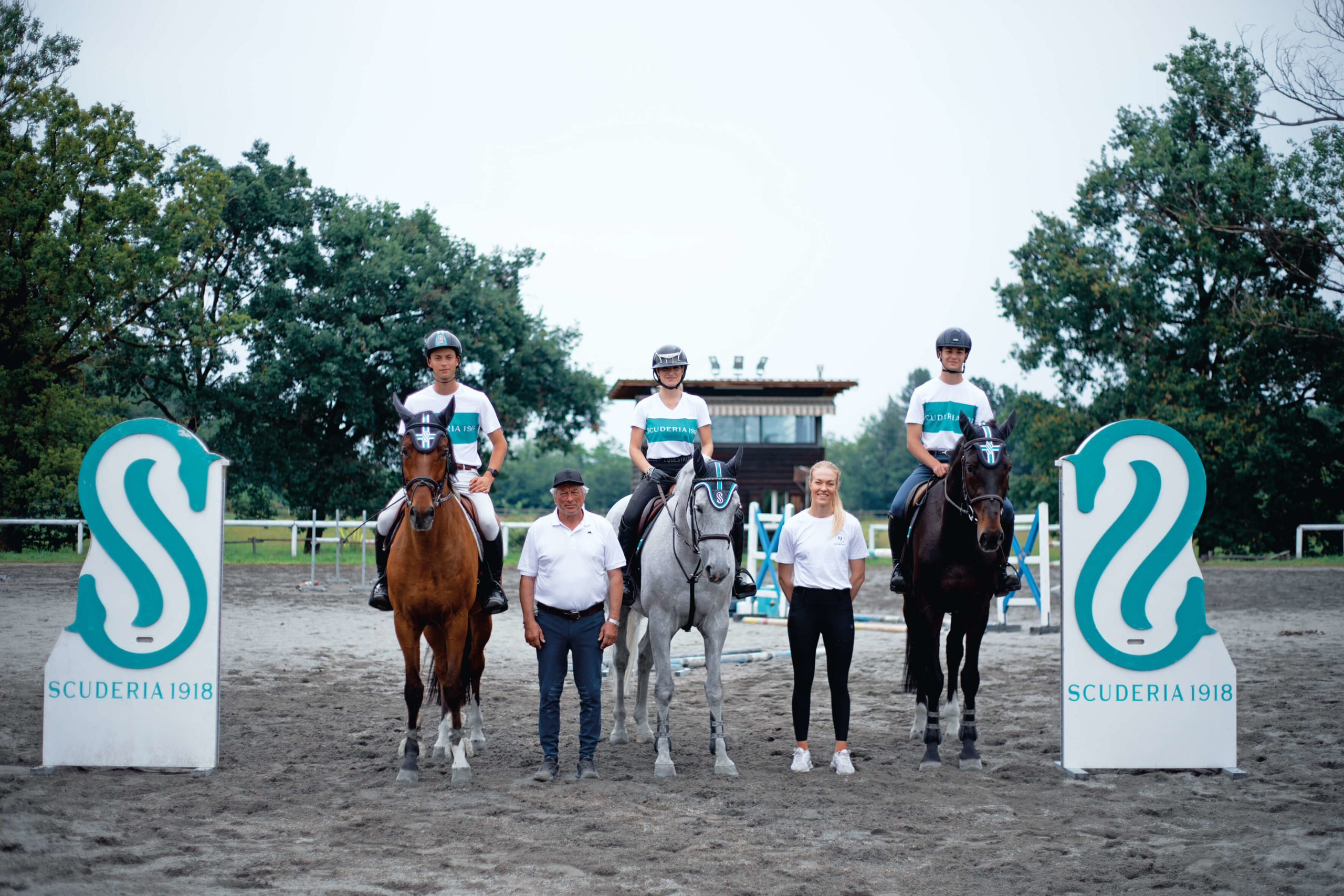Face to face with Giorgio Nuti
Not just a great rider and horseman, Giorgio Nuti is a man of extraordinary charisma, an excellent trainer with exceptional sensitivity, qualities that allow him to have great communication with horses.
Giorgio Nuti embodies the wisdom and experience of many years of activity on the competition fields, as a rider and as a trainer of young horses and riders.
Direct, ironic and concrete, Giorgio Nuti has an incredible experience and knowledge.
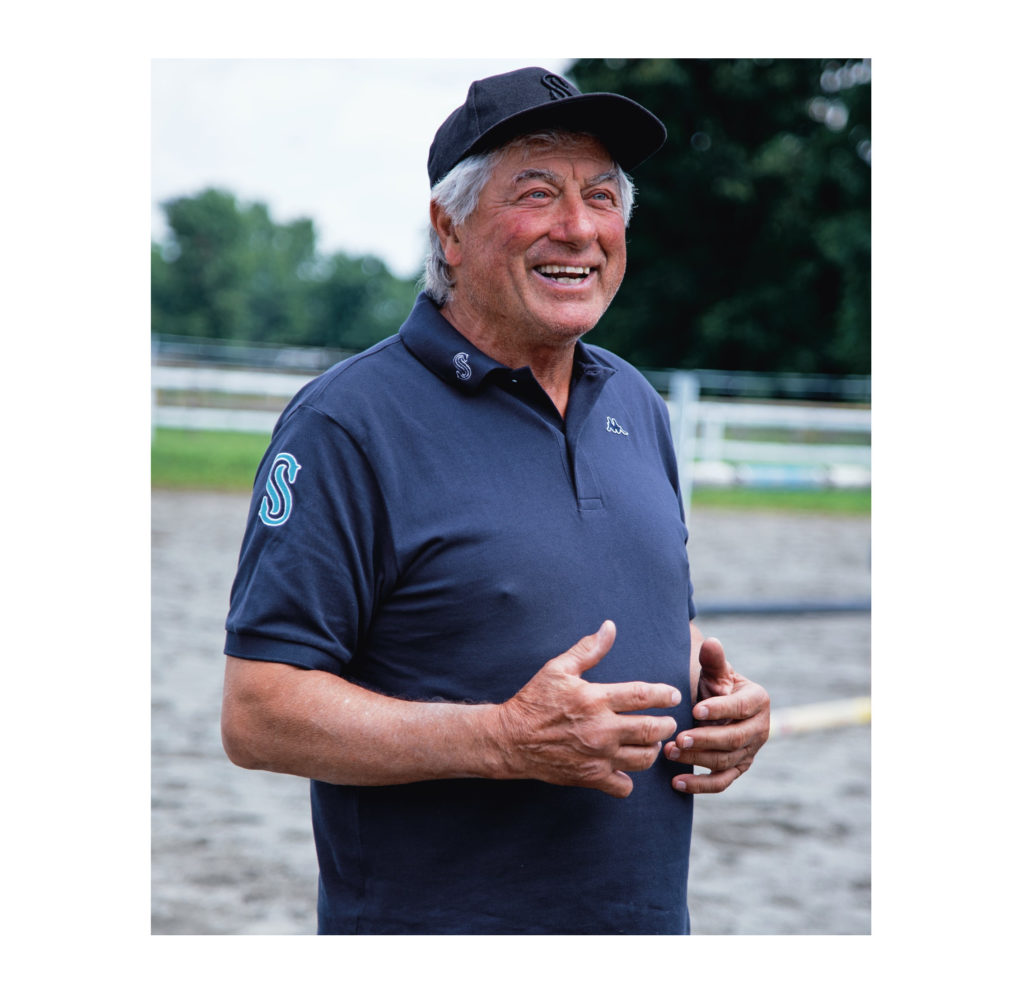
The Interview
With an outstanding CV, Giorgio is a rider who has represented Italy at the highest international levels for decades, has carried on the legacy of the d’Inzeo brothers and Graziano Mancinelli. With other riders of his generation, he is one of the greatest of equestrianism not only in Italy but worldwide. «The d’Inzeo brothers were the greatest, we were the ones who tried to follow them, but the best are always the ones who win the medals. We have tried to take up their legacy.» This way, elegantly, Giorgio Nuti comments on the introduction to the interview…
Who were we? What were the horses, the riders, the courses like? What was the sport like compared to today? In your opinion, what has been the biggest evolution of our sport?
To put it simply, I believe that sport, the work of the horses, the cantering, the cadences of the gaits… are always the same. What has changed is the way jumps are built; in the olden days the jumps were very full and there was a tendency to use powerful and perhaps not very careful horses. Today, however, the jumps are emptier, very light and delicate, with smaller poles. We need very well trained, respectful horses with a lot of blood. So, the quality of the horses is essential. The work and training of horses are always fundamental, they were years ago as they are now. The duration of the courses has changed. Before there was more time to organize the turns, now everything is very tight. If you add even one more stride you are already too slow. This is one of the biggest challenges these days.
Time that counts and ‘comfortable courses’
I believe that in Italy we must work harder to face these challenges, we must adapt to modern courses. – adds Giorgio Nuti – Our course builders are very good, but our courses are not challenging. I think that in 1.30 meter and over categories, we must adapt to the time limit of courses of the best nations. In practice, we have to gallop faster. Even at national shows, if we manage to add two strides in a line we are already out, we are already penalized. However, this change has not yet occurred. The courses continue to be comfortable, everyone is happy but being happy leads to nothing, and unfortunately it doesn’t make us grow. When we go abroad and we are told to stay inside the time, we already have an issue. ‘We must stay inside the time, but time is short, and we are not used to it. We start galloping but, in the end, we make some mistakes precisely because we are not used to it. This is already a big difference that penalizes us against nations ahead of us. I rode with the d’Inzeo brothers, Graziano Mancinelli and all the younger riders of my generation, and we were kids with a great desire to learn, to grow. However, the work approach was the same as today. The way is the same as in the past, but today we need a more winning mentality, we must not be satisfied.
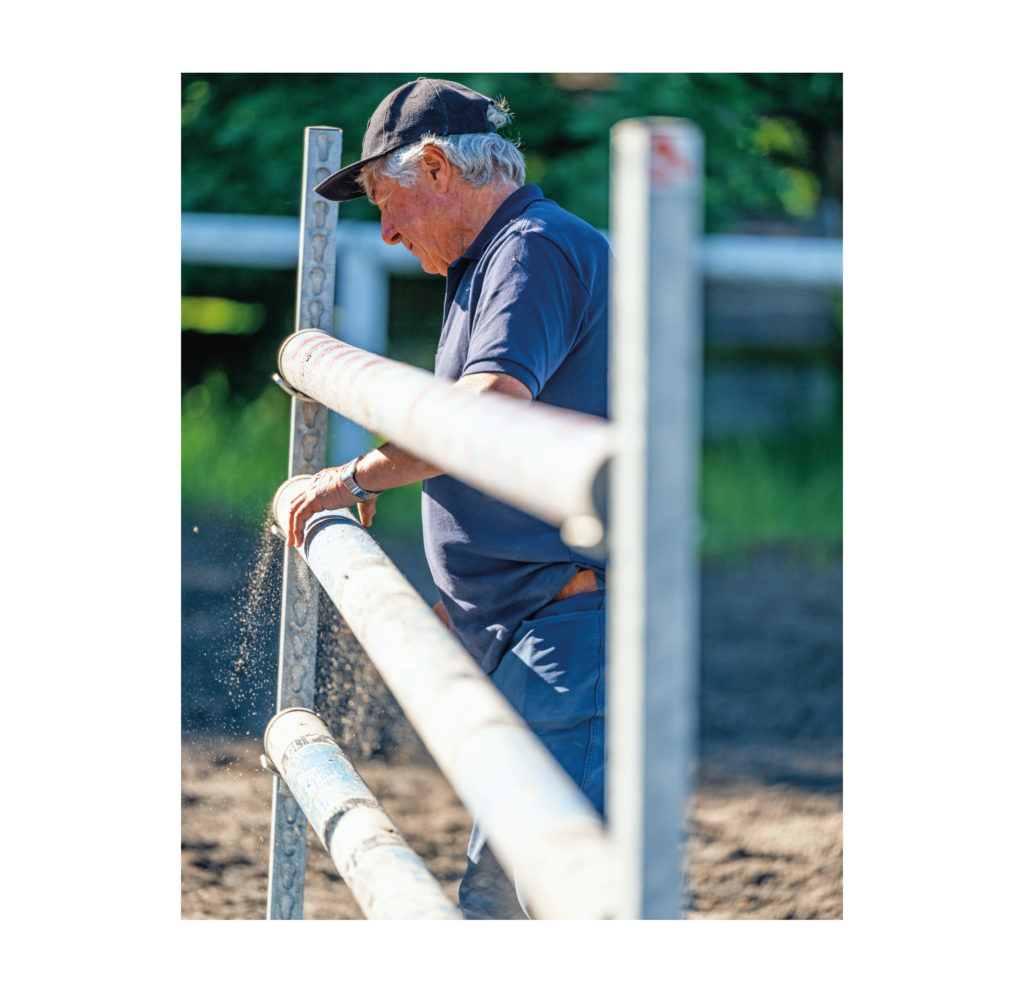
Giorgio, you work a lot with young people, as a coach of the Italian federation. What do they need to build a stable and successful career?
Precisely because the courses have changed, young people must first of all have good instructors and good horses, but what must be insisted upon the most is flat work. These days, too little work is done on the flat. We are good at jumping but lacking in basic work and preparation on the flat. I often notice this from certain exercises that I have done in the various clinics, and I realize that even at high level riders struggle! This denotes the lack of a solid and well-planned work. If we look at the best foreign riders, we immediately realize that they put a lot of care into the athletic condition of their horses. The horses must be able to jump the second course without effort, still fresh. Today there are two courses plus the jump off, so there are a lot of jumps. It is on these basic aspects that we must insist, flat work and training.
To change mentality, do you agree that we need to start from the base?
Of course we must start from the base. Speaking of Paris 2024, it has been twenty years, since the Athens Olympics, that the Italian show jumping team has not participated in the Olympics. A federation should be concerned. It shouldn’t be me saying what needs to be done to qualify, but the goal of a federation must be to qualify for the Olympics. There could be many reasons, one above all is the lack of planning. I would use the example of my horse Ninja which I started riding as a young horse and at eight years old was sold to Alfonso Romo for Rolf-Goran Bengtsson. Ninja was not sold because I was offered a large amount of money that could not be refused. Ninja was sold because my sponsor had no plans for him. Without plans why would we need to keep him? To compete in the national classes in Italy? At that point the best solution was selling him and giving him a real career. It was said that the horse with me always made a mistake in the Grand Prix, but the horse was eight years old, and we had to give him time to grow, he needed at least another year to mature. Then at the last minute I was asked if I wanted to take part in the Athens Olympics; I refused because you can’t improvise an Olympics! So, we sold him and with Rolf-Goran Bengtsson he had a super career, with individual silver at the Beijing Olympics and victory at the European Championships in Madrid. All this due to a lack of planning, that in my opinion is the biggest issue we have in Italy. It has always been said that we need to produce young horses, but then we see so many of these horses that in the end don’t make it to ten years old, why? Let’s ask ourselves why! I don’t want to go into details, but we need to give ourselves some answers. What must we do to qualify for the Olympics? Maybe avoid some horses from being sold? Maybe plan more and better? Missing the Olympics as a team for twenty years is certainly not a good thing. In our time we won the Nations Cup in Aachen – in 1976 – before the Montreal Olympics. Then the Olympics didn’t go well also because of the heavy ground due to the bad weather, but this is part of the job.
Is there anything you would have liked to do in your career? Do you have any regrets?
Yes, I have a regret. When I was 19, we failed to win team and individual silver at the European Championships in Munich in 1975. Vittorio Orlandi was eliminated and so we lost our team silver position finishing fifth, and Orlandi lost the individual silver medal. This is a regret. We had the medal already in our pocket. Another regret is not having won more medals. As I said at the beginning, the champion is the one who wins the medals.
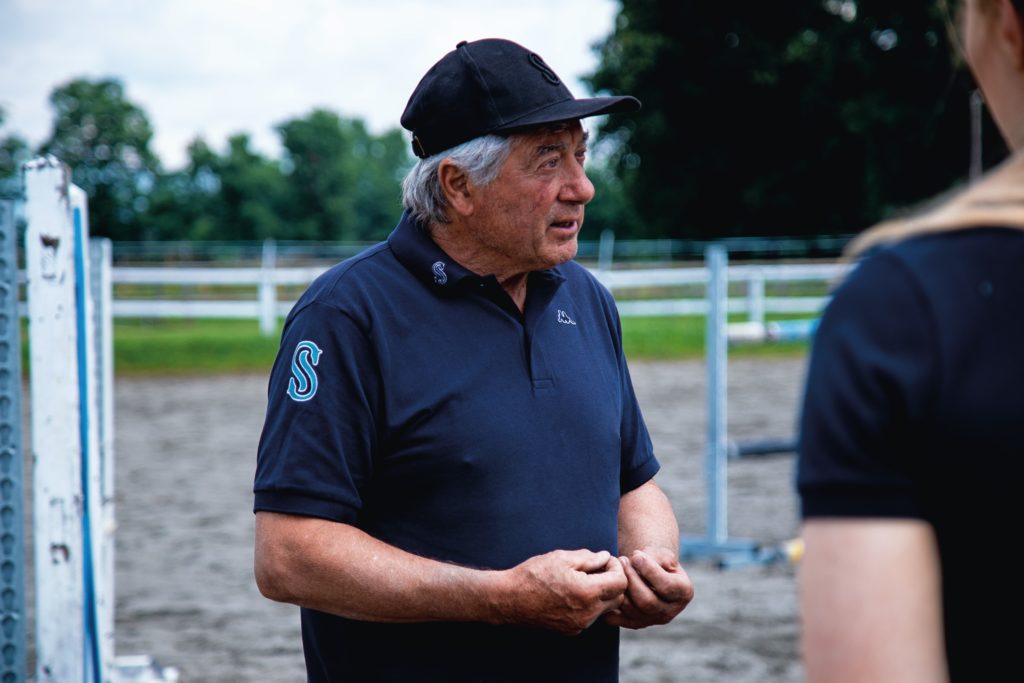
You are a great rider, horseman, trainer. Wouldn’t you have liked to be in a management position for the Italian federation?
I was the coach of the Junior team for a while, but then I resigned because there is always something that prevents us from moving forward. There have been many offers, all the presidents offered me to become a coach under certain conditions, but I always refused. There were situations I didn’t want to find myself in, I felt it wasn’t my path but I’m happy like this. My opinion is that there have been good coaches, I don’t blame any of them, but there has always been lack of planning. We need to plan. If I have a good rider with a good horse, we must try to save them for the important competitions, such as Europeans, World Games, Olympics. Of course, it is difficult to win medals but if you don’t work towards important goals what do you work for? To make the national competitions? If this is the goal lets carry on like this. The spirit must be different. For me the spirit, the sacred fire, was to win a medal, even if I didn’t succeed, but that was what I worked for, to achieve my goals.
You were a technician of the first Scuderia 1918 Talent Team Campus, an innovative format that combines technique, veterinary, ethology, management, athletic training, study and more. What do you think?
It’s a great format. We need to make it available and accessible to many young people. During the summer months we need to try to organize clinics and bring the younger riders together and introduce them to the equestrian world in general, to make them become horsemen. It would be better taking part in one less competition and attend a course like the one organized by Scuderia 1918. It should be taken as an example and it should be available to many young people. Today I’m here, tomorrow there may be other coaches, riders, trainers, personal trainers, veterinarians, farriers. We need to create the riders of tomorrow through our knowledge.
Knowing the horse is essential…
The horse is the hero of our sport. For this reason, we need to gain a profound knowledge of the horse in order to do our best job. In the end, the nations that win are always the same, because they have mastered this. Without this knowledge you can’t go anywhere. The equestrian world is not about going from one competition to another… We settle for it, we look for justifications, like the person who raises his finger towards the sky as a sign of victory… Of course, it is right to always thank the horse, he certainly deserves to be thanked, but without raising the finger as a sign of victory if you haven’t even entered the rankings… When you hear that the first round didn’t go well but we recovered in the second… What does it mean? We haven’t won anything and there are no excuses. It means there’s something wrong. So, we settle for nothin
The competitive spirit is in your blood…
Yes, I still have the competitive spirit but for the riders I train. When I sit in front of the television and observe… I see riders who have skills, but they are missing something. What is missing? It’s not my place to say what’s missing, let’s look for it… …
The next generation of ‘after d’Inzeo’
The young protagonists of the generation ‘after d’Inzeo’ and Mancinelli were Uberto Lupinetti, Roberto Arioldi, Giorgio Nuti, Emilio Puricelli, Duccio Bartalucci, Filippo Moyersoen, Francesco Bussu, plus the four officers of the Military Riding School Salvatore Oppes, Stefano Scaccabarozzi, Alessandro Galeazzi and Michele Della Casa. All of them were able to carry the weight of a very important legacy, of an Italy at the top of the world, and the great responsibility of having been the students of the greatest. And they succeeded. Each of them has had a professional and competitive career at the highest levels.
